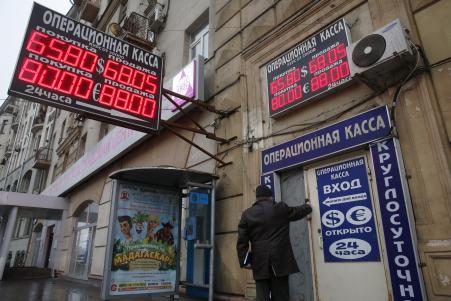By Maria Gallucci -

Major oil-rich nations are facing weakened economic outlooks next year as tumbling oil prices threaten to drop even further. Investors this week began shedding stocks and currencies closely tied to commodity prices amid growing evidence that cheap crude will stick around in 2015.
“Oil prices are going to get worse [for investors and oil-producing nations] before they get better,” Michael Loewen, a commodity strategist at TD Securities in Toronto, said by phone.
Brent crude, an international benchmark, was down 2 percent at $59.83 a barrel on Tuesday afternoon, its lowest level in more than five years. West Texas Intermediate, the U.S. price gauge, was trading around $55.93 a barrel, down from a peak of over $105 in June.
The most dramatic example of oil-fueled currency decline is Russia. The ruble has steadily fallen against the U.S. dollar in recent months due to Western sanctions and rising strain on the country’s oil-dependent economy. But the currency hit a record low Tuesday, dropping to 78.8 a dollar before settling below 64, after the central bank hiked interest rates overnight in an emergency effort to prop up the ruble.
Selling pressure on the ruble increased Tuesday as investors feared the rate hike wouldn’t be enough to offset the impacts of falling oil prices, the Wall Street Journal reported. “It’s not tradable. It’s a market you want to stay out of,” Didier Lambert, an executive director at JPMorgan Asset Management, told the newspaper.
As a result, shares in European companies that rely on Russia for profits took a dive. Austria’s Raiffeisen Bank International AG hit a record low before closing 9.4 percent lower, while Carlsberg Breweries A/S, a Danish brewing company, fell by 6.5 percent, Reuters reported Tuesday.
Norway’s krone has also suffered a hit from below-$60-a-barrel Brent crude. Oil and gas production account for about one-fourth of Norway’s gross domestic product, which makes its currency vulnerable to drops in oil prices. The krone has slipped to a 12-year low, dropping to 7.87 against the dollar early Tuesday morning before gaining slightly to 7.44.
The currencies of Brazil, Colombia, Nigeria, Turkey, Poland and Thailand have also slipped amid investor fears of falling oil prices and the imperiled Russian economy, according to media reports.
Indian analysts said they were also worried about the knock-on effects for the South Asian giant’s economy. “The sources of funds that invest in India are primarily sovereign wealth funds, pension funds and insurance funds. If Norway, Saudi Arabia, Abu Dhabi, Qatar or Kuwait are not going to see surpluses, then they will have less capital to send out, which means capital flows into India will not be as strong as they were,” Neelkanth Mishra, managing director and India equity strategist at Credit Suisse, told Economic Times, an Indian business newspaper.
India’s rupee has dropped 1.5 percent this month against the dollar, in part because of collapsing crude prices. The currency hit 63.70 on Tuesday, its weakest level since Nov. 13, 2013.
Loewen, the TD Securities strategist, said that global crude oil prices are not likely to recover by early next year. Oil-producing nations, including the United States, are showing no signs of curbing output, despite the global supply glut and weaker-than-expected growth in Europe and China.
He said that typically when oil prices fall, U.S. and Canadian producers will reduce their drilling activity because it’s harder to make a profit. This year, however, “drillers are still drilling, even though prices are half of what they were six months ago,” he said, pointing to a recent research note. “The rig count is the first stage of supply response, and that hasn’t happened yet.”
Loewen said that North American producers are likely hanging on because they need to finish out their 2014 drill programs. But members of the Organization of Petroleum Exporting Countries, led by Saudi Arabia, are refusing to budge for fear of losing market share. The analyst said that U.S. and Canadian firms will be forced to drastically reduce their capital expenditures next year, though if OPEC keeps up current levels of production, global oil prices will likely stay low.
On Sunday, the United Arab Emirates' energy minister told Bloomberg News that OPEC will stand by an earlier decision to not cut crude output even if prices drop to as low as $40 a barrel.
